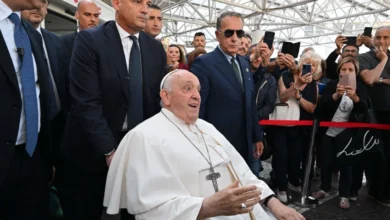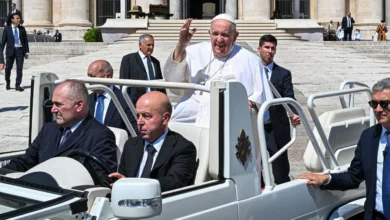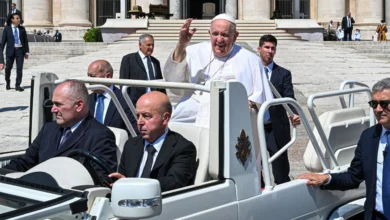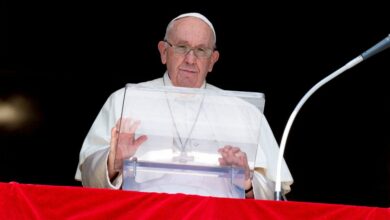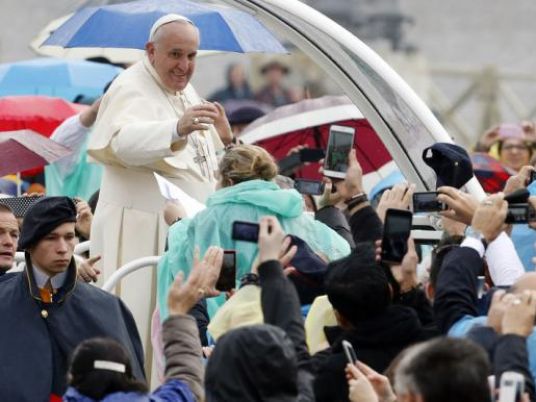
Pope Francis named 20 new cardinals, a majority of them from Africa, Asia and Latin America, increasingly key areas as the Roman Catholic Church's support shifts from its traditional European stronghold.
Fifteen of the new cardinals — considered "princes of the church" — are under the age of 80, meaning they are eligible to join the conclave which will elect the pope's successor.
In announcing the new voting cardinals on Sunday, Pope Francis said they come "from 14 countries from every continent (and) manifest the indissoluble links between the Church of Rome" and churches around the world.
The list of newly named cardinals includes three from Africa, five from Latin America as well as a combined total of five from Asia and the Pacific.
Bishop Soane Patita Paini Mafi of Tonga becomes the first cardinal from the Polynesian archipelago. At 53, he will also be the youngest.
John Dew, Archbishop of Wellington, who also made the list, described Mafi's appointment as "great news" for the region.
"Although we are geographically far from much of the world, Pope Francis has gone to the periphery of the world to name new cardinals," he said in a statement.
Meanwhile Archbishop Daniel Sturla, only the second Uruguayan to be appointed a cardinal, said he was "shocked" by honour, which comes less than a year after he was appointed archbishop of Montevideo.
The pope's choice of a Haitian cardinal in February was also a first for the church.
Despite the variety of nations represented in the pope's new choices, Europeans still accounted for the single largest group with seven, including three Italians.
– No Americans or Canadians –
Francis, who has undertaken a reform of the Vatican's administrative body known as the Curia, named only one cardinal from within it: Archbishop Dominique Mamberti, a Frenchman. He used to serve as the Vatican's foreign minister.
No American or Canadian cardinals were named on Sunday, which Vatican spokesman Father Federico Lombardi said was because "their numbers are already consistent and remained stable."
Once these new members of the College of Cardinals are officially installed on February 14, there will be 228 members, including 125 who can vote in conclaves.
The new cardinals reflect a change in church demographics, which have shifted toward Africa, Latin America and Asia in the past century.
In 1910 about 65 percent of the world's Catholics lived in Europe with 24 percent in Latin America and the Caribbean, according to a 2010 study from American think tank Pew Research Center.
By 2010 Latin America accounted for 39 percent of the church's followers while 16 percent were in Africa and 24 percent were in Europe.
Despite the new nominations, the overwhelming number of cardinals named during this and the previous two papacies have been Europeans. Over the three papacies, 57 are from Europe, 19 from Latin America and 15 from Africa, 14 from Asia and three from the Pacific.
These are the 20 new cardinals, grouped by region:
Europe:
Archbishop Dominique Mamberti of France
Archbishop Francesco Montenegro of Italy
Archbishop Luigi De Magistris of Italy (Non-voting)
Archbishop Ricardo Blazquez Perez of Spain
Archbishop Karl-Joseph Rauber of Germany (Non-voting)
Archbishop Edoardo Menichelli of Italy
Archbishop Manuel Jose Macario do Nascimento Clemente of Portugal
Africa:
Bishop Arlindo Gomes Furtado of Cape Verde
Bishop emeritus Julio Duarte Langa of Mozambique (Non-voting)
Archbishop Berhaneyesus Demerew Souraphiel of Ethiopia
Asia/Pacific:
Archbishop Charles Maung Bo of Myanmar
Archbishop John Atcherley Dew of New Zealand
Archbishop Francis Xavier Kriengsak Kovithavanij of Thailand
Bishop Soane Patita Paini Mafi of Tonga
Archbishop Pierre Nguyen Van Nhon of Hanoi
Latin America:
Archbishop Daniel Fernando Sturla Berhouet of Uruguay
Archbishop Alberto Suarez Inda of Mexico
Bishop Jose Luis Lacunza Maestrojuan of Panama
Archbishop Jose de Jesus Pimiento Rodriguez of Colombia (Non-voting)
Archbishop emeritus Luis Hector Villaba of Argentina (Non-voting)

